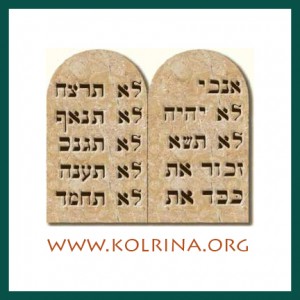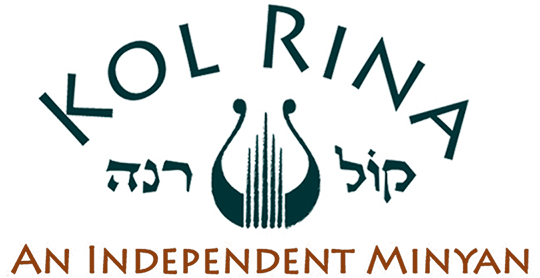Ten Commandments for Our Day
A D’var Torah for Parsha Yitro
January 18, 2014 | By Willa Bruckner
 The older I get, the more I am troubled by the G-d we experience in this part of the Bible — a G-d predisposed to shows of power and might that challenge and instill fear in people. We’ve talked before in our minyan about this G-d, but I’m reminded again of this G-d’s character as we listen to the Ten Commandments — with the lightning, the sounds of the shofar, and the spectacle that accompanied the giving of the Commandments. Even the words of the Commandments put us in our place, as G-d the master tells us from on high what to do and what not to do.
The older I get, the more I am troubled by the G-d we experience in this part of the Bible — a G-d predisposed to shows of power and might that challenge and instill fear in people. We’ve talked before in our minyan about this G-d, but I’m reminded again of this G-d’s character as we listen to the Ten Commandments — with the lightning, the sounds of the shofar, and the spectacle that accompanied the giving of the Commandments. Even the words of the Commandments put us in our place, as G-d the master tells us from on high what to do and what not to do.
People are made in the image of G-d, yet I stay far away from people who exhibit the qualities we see in this G-d. Of course, we can look at the story of the Ten Commandments in a historical perspective, or attribute the character of this G-d to the scribe for this portion of the Bible, or think that this G-d might have been what the Hebrews needed at the time, having just come out of slavery in Egypt. But I’m not so much of a history buff, and I want the Bible to have meaning and relevance for my life today, particularly something as fundamental as the Ten Commandments. So I started imagining how the Ten Commandments might have been written if they had come from a side of G-d that was gentler and (dare I say) more mature, if G-d had tried to touch us from the inside instead of lording over us from the outside, and if G-d had empowered us to connect with G-d and with each other spiritually and to experience what we say every day in the Shma: ad-nai echad, G-d is one. Imagine along with me as we listen to the Ten Commandments a second time this morning.
- Look deep within yourself, to your core, beyond the self-criticism, the self-doubts and the expectations, and find the spark of G-d that lies within you. From that place, you have the ability to free yourself from all that enslaves you.
- Money, possessions and position don’t free you. They may provide temporary havens and make you feel good for a while, but they cannot replace a deep inner connection to G-d.
- Be honest with yourself. You have no reason to fear your true nature; it holds a power that is good and pure.
- Take time to quiet the noise, the external demands and the internal battles, so you can remind yourself of what is at your center and revitalize your spirit, on a weekly and a daily basis.
- Your relationships with friends, co-workers, family, and parents, and all your experiences in the past — they don’t define you. Rather, they are a mirror in which you can catch a glimpse of your true nature. Respect them and keep them in that proper place, so you can live fully in the present.
- Help others see the spark of G-d within themselves, so they may live fully in the present, with joy.
- Especially do so for those with whom you are closest. Once your souls have touched, you can choose, every single day, to keep that connection sacred, even in the midst of the drudgery and disappointments that accompany the day-to-day business of living.
- Be a giver, not a taker. If the spark of G-d within you can touch the spark of G-d within another, then both will experience the one-ness of G-d and the world’s possibilities will be limitless.
- Just as you should be honest with yourself about your true nature, so you must be honest with and about others so you can help them to see the wonder of their being.
- Cherish and appreciate what you have — it can be gone in a moment. How much sweeter it is to enjoy it while you have it than to yearn for it after it’s gone. If you live fully in the present with what you have now, you can help others to do the same and your connection with G-d and with others will be seamless.
I can no longer see the Ten Commandments as ten distinct commandments. Instead, I see them as ten entry points into a holistic code for living. For me, this is a work in progress, one which I look forward to exploring in the next part of my spiritual journey. May our individual spiritual journeys allow us to come together, and may we be blessed to experience G-d as one – ad-nai echad.

